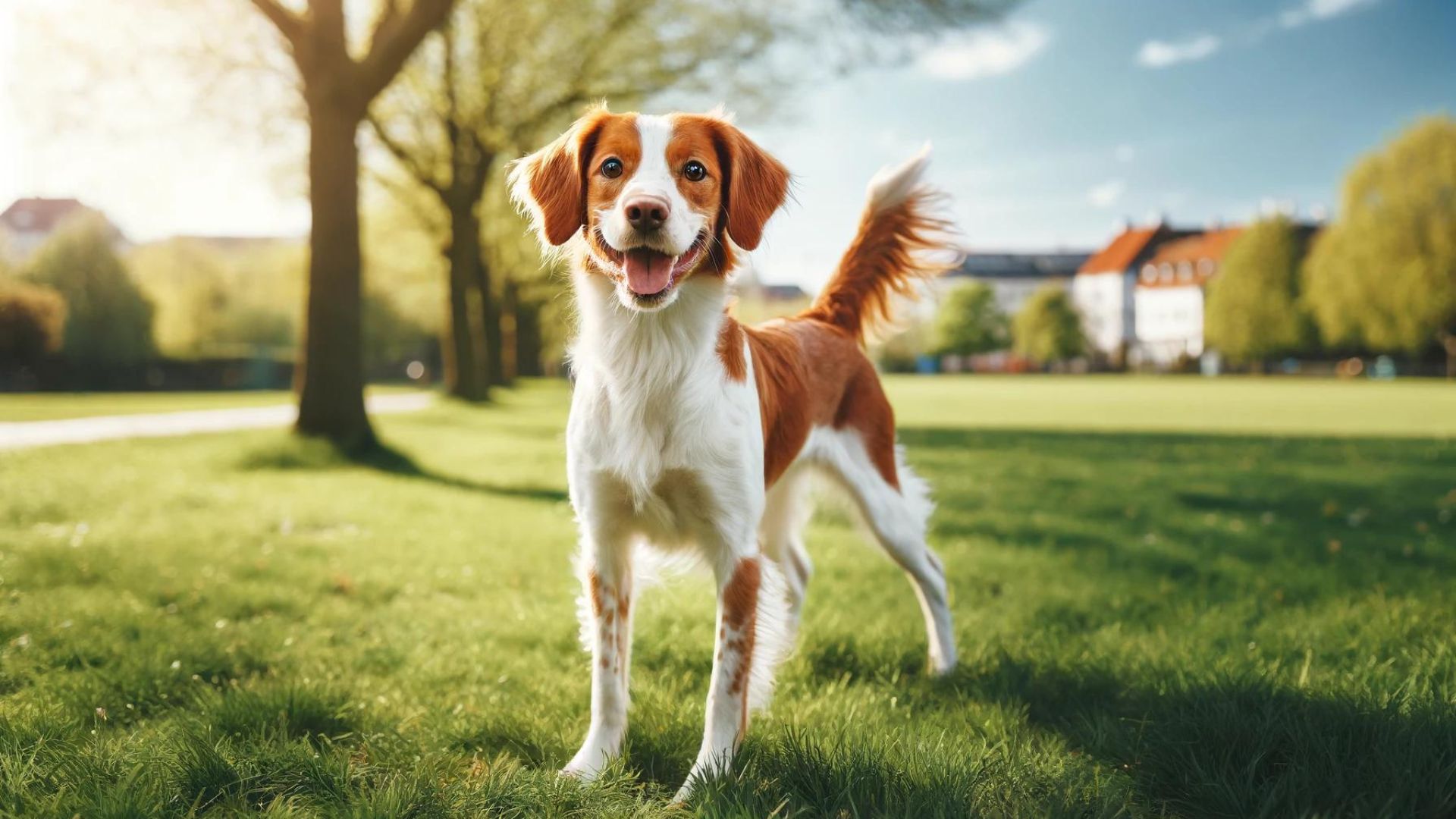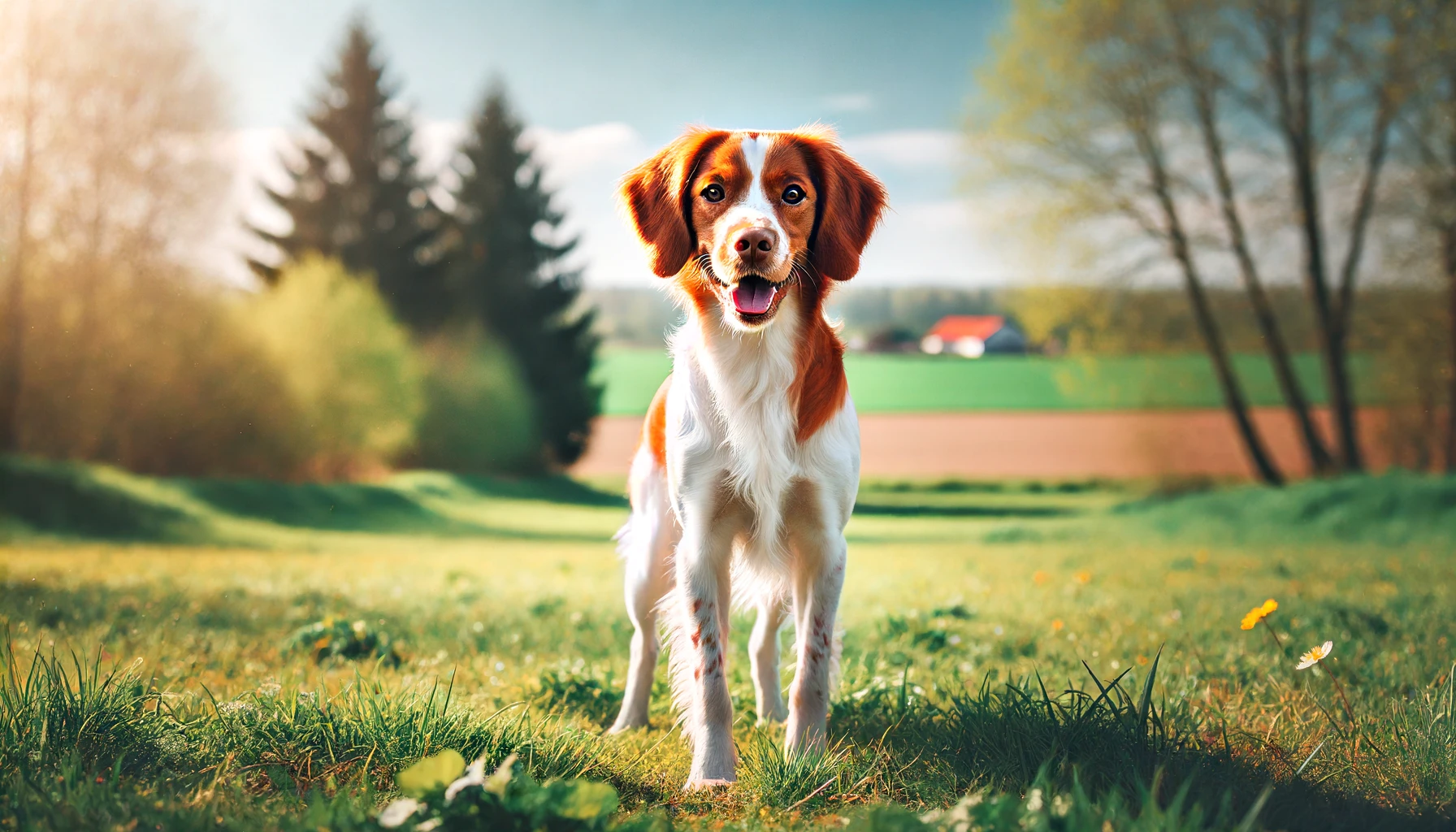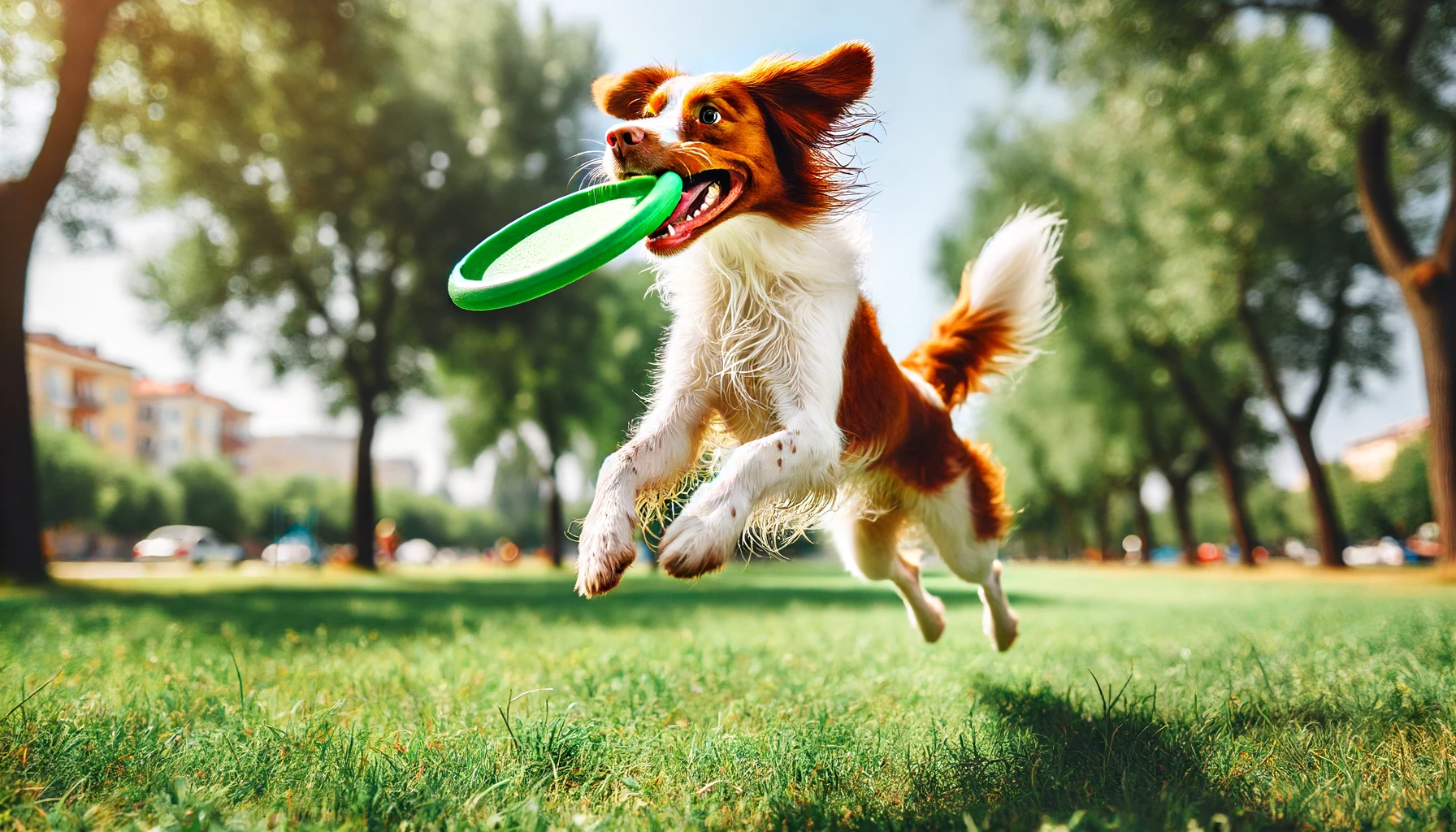Introduction to the Brittany Dog
The Brittany dog, known for its friendly nature, is a beloved breed cherished for its intelligence and loyalty. These medium-sized dogs have a distinctive coat that often comes in shades of orange and white. Their energetic demeanor makes them excellent companions for active families who enjoy outdoor adventures. Brittanys are quick learners and excel in activities like hunting and agility training, where their agility and sharp senses shine.
With a history rooted in hunting, Brittanys are natural-born athletes with a keen sense of smell. They originated in France and were bred for bird hunting, showcasing their instincts and sharp focus. Despite their hunting prowess, they are also affectionate pets, known for their gentle temperament and love for human companionship. Whether playing fetch in the park or cuddling at home, Brittany dogs bring joy and energy to any household, making them a popular choice for dog lovers seeking a devoted friend and a skilled partner in outdoor activities.
History and Origin of the Brittany Dog
Early Beginnings in Brittany, France
The Brittany dog, originally known as the Brittany Spaniel, hails from the Brittany region in northwestern France. This breed’s history dates back to the 17th century when it was developed for its exceptional hunting skills.
The Role of French Hunters
French hunters played a significant role in the development of the Brittany dog. They selectively bred the Brittany for its versatility in the field, particularly its abilities as a pointer and retriever. This made the Brittany an invaluable companion for hunting birds.
Crossbreeding for Excellence
The breed’s early development involved crossbreeding with English settlers and possibly other spaniels. This genetic blending contributed to Brittany’s keen sense of smell, agility, and distinctive appearance.
Recognition and Standardization
The Brittany was officially recognized as a distinct breed in the early 20th century. The first breed standard was established in France in 1907. The American Kennel Club (AKC) recognized the Brittany in 1934, further solidifying its status as a unique breed.
Evolution in the United States
The Brittany continued to evolve in the United States as a premier hunting dog. American breeders focused on enhancing the breed’s hunting instincts and physical attributes, leading to subtle differences between American and French Brittanys.
Modern-Day Brittany
Today, the Brittany dog is celebrated for its versatility, intelligence, and affectionate nature. It remains a popular choice for hunters and families, admired for its rich history and enduring qualities.
Physical Characteristics of the Brittany Dog

Size and Build
The Brittany dog is a medium-sized breed with a compact, athletic build. They typically stand between 17.5 to 20.5 inches (44 to 52 cm) tall at the shoulder and weigh between 30 to 40 pounds (14 to 18 kg). Their well-proportioned body allows for agility and speed, making them excellent hunting companions.
Coat and Color
Brittany dogs have a dense, flat, or wavy coat that protects them in various weather conditions. The coat is typically short to medium, with feathering on the ears, chest, legs, and belly. Common coat colors include orange and white, liver and white, and tricolor (black, white, and orange). The breed’s coat patterns can vary, with some dogs having spots or roan (a mix of colored and white hairs).
Head and Expression
The Brittany has a slightly rounded skull with a medium-length muzzle that tapers to the nose. Their nose color usually matches their coat color, brown or pink. They have expressive, dark eyes that convey a sense of intelligence and alertness. The ears are set high, short, triangular, and slightly rounded at the tips, hanging close to the head.
Tail
Traditionally, Brittany dogs have a naturally short tail or a tail docked to a length of about 4 inches (10 cm). Some Brittanys may be born with a longer tail, often left undocked in countries where docking is prohibited. The tail is carried horizontally and is lively, reflecting the breed’s energetic nature.
Movement and Gait
The Brittany dog exhibits a smooth, ground-covering gait. Their movement is characterized by a quick and agile stride, with good reach in the front and drive in the rear. This efficient movement enables Brittany to cover large areas quickly when hunting or during outdoor activities.
Overall Appearance
Overall, the Brittany dog is a balanced and agile breed, combining strength and elegance. Their athletic physique, combined with their friendly and alert expression, makes them both an attractive and functional dog. Their physical characteristics reflect their history as versatile hunting dogs, capable of performing various tasks with enthusiasm and efficiency.
Temperament and Personality Traits
Energetic and Active
The Brittany dog is known for its high energy levels and loves for physical activity. They thrive on regular exercise and outdoor activities, making them excellent companions for active individuals or families who enjoy hiking, running, or engaging in dog sports. Their boundless energy makes them well-suited for roles as hunting dogs and companions in active households.
Friendly and Affectionate
Brittany dogs are renowned for their friendly and affectionate nature. They form strong bonds with their families and are known to be gentle and loving with children. Their friendly personality means they enjoy being around people and often seek attention and companionship. They are also typically friendly with other dogs and pets when properly socialized.
Intelligent and Trainable
Highly intelligent and eager to please, Brittany dogs excel in training. They are quick learners and respond well to positive reinforcement methods. Their intelligence and versatility make them suitable for various roles, including obedience training, agility, and fieldwork. Consistent training and mental stimulation are essential to keep them engaged and well-behaved.
Alert and Responsive
Brittany dogs possess a keen sense of awareness and are naturally alert. This makes them excellent watchdogs, as they will quickly alert their owners to any unusual activity or strangers approaching their territory. However, their friendly nature means they are not typically aggressive or overly protective.
Curious and Adventurous
Brittany dogs have a curious and adventurous spirit. They love to explore their surroundings and can be quite independent when on the scent of something interesting. This trait, while endearing, means they should always be kept in a secure area or on a leash during walks to prevent them from wandering off.
Sensitive and Responsive
Brittany dogs are known for their sensitivity to their owner’s emotions and commands. They thrive in a positive, loving environment and can become anxious or withdrawn if treated harshly. Gentle, consistent training and a supportive atmosphere are key to bringing out the best in this breed.
Playful and Joyful
With their playful and joyful demeanor, Brittany dogs bring their families a lot of fun and happiness. They enjoy interactive play, games, and activities that allow them to burn off energy and engage with their loved ones. Their exuberant personality makes them a delight to be around.
Training and Socialization Tips
Start Early with Socialization
Begin socializing your Brittany dog as early as possible. Introduce them to various people, places, sounds, and experiences during their puppyhood. This will help them become well-rounded and confident adults. Puppy classes can be a great way to start this process, providing controlled environments where they can interact with other dogs and people.
Positive Reinforcement is Key
Brittany’s dogs respond exceptionally well to positive reinforcement techniques. Use treats, praise, and affection to reward good behavior. Avoid harsh corrections or punishment, as Brittanys are sensitive and can become anxious or fearful if treated harshly. Consistent and positive training methods will yield the best results.
Keep Training Sessions Short and Fun
Brittanys are intelligent but can become bored with repetitive tasks. Keep training sessions short, engaging, and fun to maintain their interest. Incorporate a variety of commands and activities to keep their minds stimulated. Aim for multiple short sessions throughout the day rather than one long session.
Focus on Basic Commands First
Start with basic commands such as “sit,” “stay,” “come,” and “heel.” These commands provide a foundation for more advanced training and help establish control and communication between you and your dog. Use consistent cues and be patient as your Brittany learns these essential skills.
Crate Training for Housebreaking
Crate training can be an effective method for housebreaking your Brittany dog. It provides them a safe and secure space and helps establish bathroom break routines. Ensure the crate is comfortable, and never use it as a punishment.
Leash Training and Recall
Given their high energy and hunting instincts, it’s important to train your Brittany to walk on a leash and to have a reliable recall command. Practice leash walking in a controlled environment before venturing out to busier areas. For recall training, start in a secure, enclosed space and gradually increase the level of distraction.
Mental Stimulation and Enrichment
Brittany dogs need plenty of mental stimulation to prevent boredom and destructive behavior. Provide puzzle toys, interactive games, and training challenges to engage their minds. Incorporating scent work or agility exercises can also be beneficial, tapping into their instincts and abilities.
Consistency and Patience
Consistency is crucial in training a Brittany dog. Ensure all family members follow the same commands and the same training protocols. Be patient and persistent, as training takes time and effort. Celebrate small victories and build on them gradually.
Socialize with Other Dogs
Regularly expose your Brittany to other dogs in controlled settings, such as dog parks, playdates, or training classes. This helps them develop good manners and social skills with their canine peers. Monitor interactions to ensure they are positive and prevent any negative experiences.
Provide Plenty of Exercises
A tired dog is a well-behaved dog. Ensure your Brittany gets plenty of physical exercise to burn off their energy. Daily walks, runs, and play sessions are essential. Incorporating activities like fetch, frisbee, or hiking can also help keep them physically and mentally fit.
Enroll in Advanced Training or Dog Sports
Consider enrolling your Brittany in advanced training classes or dog sports like agility, obedience, or field trials. These activities provide excellent mental and physical outlets and strengthen the bond between you and your dog. Brittanys excel in these areas due to their intelligence and agility.

Health and Lifespan of the Brittany Dog
Average Lifespan
The Brittany dog is generally a healthy and robust breed with an average lifespan of 12 to 14 years. Some Brittanys can live even longer with proper care, regular veterinary check-ups, and a healthy lifestyle.
Common Health Issues
While the Brittany is a hardy breed, they can be prone to certain health issues. Awareness of these conditions can help in early detection and management:
- Hip Dysplasia: This is a common genetic condition where the hip joint doesn’t fit properly into the hip socket, leading to arthritis and pain. Regular exercise and maintaining a healthy weight can help manage symptoms.
- Epilepsy: Brittanys can be prone to epilepsy, which causes seizures. While it can be managed with medication, it requires regular veterinary care and monitoring.
- Hypothyroidism: This condition occurs when the thyroid gland doesn’t produce enough hormones, leading to weight gain, lethargy, and skin issues. It can be managed with medication and regular blood tests.
- Ear Infections: Their floppy ears make Brittanys susceptible to ear infections. Regular ear cleaning and monitoring can help prevent this issue.
- Eye Conditions: Brittanys can be prone to eye conditions such as cataracts and progressive retinal atrophy (PRA). Regular eye examinations by a veterinarian can help detect these issues early.
- Allergies: Like many breeds, Brittanys can suffer from allergies, which can cause skin irritations, itching, and gastrointestinal issues. Identifying and avoiding allergens can help manage this condition.
Regular Veterinary Care
Regular veterinary check-ups are essential to ensure your Brittany dog remains healthy. Annual examinations, vaccinations, and preventive care such as flea, tick, and heartworm treatments are crucial. Your veterinarian can also guide diet, exercise, and overall health maintenance.
Diet and Nutrition
A balanced and nutritious diet is vital for the health and longevity of your Brittany dog. High-quality commercial dog food or a well-balanced homemade diet should provide all the necessary nutrients. Avoid overfeeding, as Brittanys can be prone to obesity, which can exacerbate health issues like hip dysplasia. Always provide fresh water and consider dietary supplements if recommended by your veterinarian.
Exercise and Mental Stimulation
Brittanys are high-energy dogs that require plenty of physical exercise and mental stimulation. Daily walks, runs, and playtime are essential to keep them physically fit and mentally engaged. Activities like fetch, agility training, and puzzle toys can help fulfill their activity needs and prevent boredom.
Grooming and Hygiene
Regular grooming is important for the health and well-being of your Brittany dog. Brush their coat weekly to remove loose hair and prevent matting. Regular ear cleaning, dental care, and nail trimming are essential to their grooming routine. Bathing should be done as needed, depending on their activity level and coat condition.
Genetic Testing and Responsible Breeding
When choosing a Brittany puppy, selecting a reputable breeder who performs genetic testing on their breeding stock is important. This can help reduce the risk of hereditary conditions such as hip dysplasia and epilepsy. Responsible breeders should provide health clearances for the puppy’s parents and be knowledgeable about the breed’s health concerns.
Signs of a Healthy Brittany Dog
A healthy Brittany dog should have bright, clear eyes, a shiny coat, and a good appetite. They should be energetic alert, and exhibit a healthy weight. Observing your dog’s behavior, appetite, and physical condition can help detect potential health issues early.
Grooming and Maintenance Requirements

Coat Care and Brushing
The Brittany dog has a dense, medium-length coat that can be flat or wavy. Regular brushing is essential to keep their coat healthy and free from mats and tangles. Aim to brush your Brittany at least once a week, often during shedding seasons. Use a slicker brush or a comb to remove loose hair and debris. Brushing also helps distribute natural oils, keeping their coat shiny and healthy.
Bathing
Brittany dogs do not require frequent baths. Bathing them every two to three months is usually sufficient unless they get dirty or smelly. Use a mild dog shampoo that won’t strip their coat of natural oils. Be sure to rinse thoroughly to avoid any residue irritating their skin.
Ear Care
Due to their floppy ears, Brittanys are prone to ear infections. Regular ear cleaning is crucial to prevent this. Check their ears weekly for redness, odor, or excess wax. Use a veterinarian-recommended ear cleaner and cotton balls to clean the outer part of their ears gently. Avoid inserting anything into the ear canal to prevent injury.
Dental Care
Dental hygiene is important for Brittany’s overall health. Brush their teeth at least twice to thrice a week using a dog-specific toothbrush and toothpaste. Regular brushing helps prevent plaque buildup, gum disease, and bad breath. Dental chews and toys can also help maintain their dental health.
Nail Trimming
Regular nail trimming is necessary to keep your Brittany’s nails at a comfortable length. Overgrown nails can cause discomfort and lead to issues with walking and posture. Trim their nails every three to four weeks or as needed. If you’re unsure about trimming your nails, consult a veterinarian or a professional groomer.
Eye Care
Brittany dogs can be prone to certain eye conditions, so regular eye care is important. Check their eyes weekly for signs of redness, discharge, or cloudiness. Wipe around their eyes with a damp, soft cloth to remove debris or tear stains. If you notice any persistent issues, consult your veterinarian.
Anal Gland Care
Some Brittany dogs may require regular anal gland expression to prevent discomfort and infection. If your dog is scooting or licking their rear excessively, it may be a sign that their anal glands need attention. Your veterinarian or a professional groomer can perform this task if needed.
Exercise and Mental Stimulation
Maintaining Brittany’s physical and mental health is crucial for their well-being. Give them plenty of daily exercise to burn off their high energy levels. Running, hiking, playing fetch, and agility training are excellent ways to keep them physically fit. Additionally, mental stimulation through puzzle toys, obedience training, and interactive play is essential to prevent boredom and destructive behavior.
Seasonal Care
Brittany dogs may require additional grooming and maintenance during certain seasons. In the winter, check their paws for ice and snow buildup, and consider using a pet-safe paw balm to protect their pads from cold and salt. In the summer, ensure they can access shade and water to prevent overheating and check for ticks and other parasites after outdoor activities.
Professional Grooming
While Brittanys do not require extensive grooming, occasional visits to a professional groomer can be beneficial. A groomer can perform tasks such as nail trimming, ear cleaning, and anal gland expression and can give your dog a thorough bath and brush. Professional grooming can also help keep their coat in top condition and reduce shedding.
Nutrition and Diet for the Brittany Dog
Understanding Nutritional Needs
The Brittany dog is an active and energetic breed, requiring a balanced and nutritious diet to support their lifestyle. High-quality commercial dog food, either dry kibble or wet food, is formulated to meet the dietary needs of dogs and can be a convenient and reliable choice. Look for dog foods that list meat as the first ingredient and are free from artificial additives, fillers, and by-products.
Essential Nutrients
A well-balanced diet for a Brittany dog should include the following essential nutrients:
- Protein: Essential for muscle development and repair, protein should comprise a significant portion of your Brittany’s diet. Look for dog foods that contain high-quality animal protein sources, such as chicken, beef, lamb, or fish.
- Fats: Fats provide a concentrated energy source and support healthy skin and coat. Ensure the diet includes healthy fats like fish, flaxseed, and chicken fat.
- Carbohydrates: Carbohydrates provide energy and fiber for digestion. Whole grains like brown rice, oats, barley, and vegetables like sweet potatoes and peas are good sources of carbohydrates.
- Vitamins and Minerals: Essential for overall health, vitamins, and minerals should be included in your Brittany’s diet. A balanced commercial dog food will contain the necessary vitamins and minerals, but you can also add fresh fruits and vegetables to their diet for an extra boost.
- Water: Fresh, clean water should always be available for your Brittany dog. Proper hydration is essential for their health and well-being.
Feeding Guidelines
Follow these general feeding guidelines for your Brittany dog:
- Puppies: Brittany puppies have higher energy needs and should be fed a specially formulated puppy food that supports growth and development. Feed them three to four times a day until they are about six months old, then transition to two meals daily.
- Adults: Adult Brittany dogs typically do well with two meals a day. Follow the feeding recommendations on the dog food packaging, adjusting the amount based on your dog’s age, weight, activity level, and overall health.
- Seniors: As Brittany dogs age, their nutritional needs may change. Senior dog foods are formulated to meet the needs of older dogs, with adjusted protein and fat levels to support aging joints and metabolism. Consult your veterinarian for specific recommendations.
- Portion Control and Weight Management
Maintaining a healthy weight is crucial for Brittany’s overall health. Overfeeding can lead to obesity, which can exacerbate health issues such as hip dysplasia and diabetes. Measure your dog’s food portions accurately and monitor their weight regularly. If your Brittany is gaining excess weight, adjust their food intake and increase their exercise.
Special Dietary Considerations
Some Brittany dogs may have specific dietary needs or allergies. Common food allergens include beef, dairy, wheat, and soy. If you suspect your dog has a food allergy or sensitivity, consult your veterinarian to identify the allergen and choose an appropriate diet, such as a limited-ingredient or hypoallergenic dog food.
Treats and Supplements
Treats can be a valuable training tool and a way to bond with your Brittany, but they should be given in moderation. Choose healthy, low-calorie treats and avoid overfeeding. Treats should comprise no more than 10% of your dog’s daily caloric intake.
Supplements can benefit certain health conditions or enhance your dog’s diet. Common supplements for Brittany dogs include fish oil for a healthy coat and joints, glucosamine and chondroitin for joint health, and probiotics for digestive health. Always consult your veterinarian before adding supplements to your dog’s diet.
Homemade and Raw Diets
Some owners prefer to feed their Brittany dogs homemade or raw diets. While these diets can be nutritionally adequate, they require careful planning and preparation to meet your dog’s nutritional needs. Consult a veterinarian or a canine nutritionist for guidance if you choose to prepare homemade or raw meals.

Exercise Needs and Activities
High Energy Levels
Brittany dogs are known for their high energy levels and require plenty of daily exercise to maintain their physical and mental well-being. These active dogs thrive on vigorous activities that challenge their bodies and minds.
Daily Exercise Requirements
Brittanys need a minimum of one to two hours of exercise each day. This can be broken down into multiple sessions, including walks, runs, playtime, and other activities. Providing a variety of exercises helps keep them engaged and prevents boredom.
Walking and Running
Daily walks are essential for Brittany’s health. Aim for at least one long walk each day, complemented by shorter walks or runs. Running is particularly beneficial for Brittanys, allowing them to expend energy efficiently. If you enjoy jogging, your Brittany will make an excellent running partner.
Off-Leash Play
Brittanys love to run and explore, so providing opportunities for off-leash play in a secure, fenced area is ideal. Dog parks, large backyards, or open fields where they can safely run and play are great options. Off-leash play allows them to burn off excess energy and enjoy their instincts to run and explore.
Fetch and Frisbee
Interactive games like fetch and frisbee are perfect for Brittanys. These activities not only provide physical exercise but also stimulate their minds. Use a ball, frisbee, or other toys to engage your Brittany in a fun and energetic game of fetch.
Agility training is an excellent way to channel your Brittany’s energy and intelligence. Setting up an agility course with obstacles like jumps, tunnels, and weave poles can provide a challenging and stimulating exercise. Many Brittanys excel in agility competitions due to their athleticism and quick learning abilities.
Hiking and Outdoor Adventures
Brittanys are natural adventurers and love exploring the outdoors. Hiking is a great way to provide them with physical exercise and mental stimulation. Choose trails that are dog-friendly and suitable for their fitness level. Always bring water and be mindful of weather conditions to keep your Brittany safe and comfortable.
Swimming
Many Brittany dogs enjoy swimming, an excellent low-impact exercise that works their muscles without putting stress on their joints. If your dog enjoys water, consider taking them to a dog-friendly beach, lake, or pool for a swim. Always supervise them around the water to ensure their safety.
Obedience and Trick Training
Training sessions are a great way to provide mental exercise for your Brittany. Teaching them new commands tricks, or practicing obedience skills engages their minds and strengthens the bond between you and your dog. Use positive reinforcement techniques to keep training sessions fun and rewarding.
Scent Work and Nose Games
Brittanys have an excellent sense of smell and enjoy using their noses. Scent work or nose games, such as hide-and-seek or scent detection, provide mental stimulation and satisfy their instincts. Hide treats or toys around the house or yard and encourage your Brittany to find them.
Socialization and Playdates
Regular socialization with other dogs is important for Brittany’s overall well-being. Arrange playdates with other dogs or visit dog parks to allow them to interact and play. Socializing with other dogs provides mental stimulation and helps develop good manners and social skills.
Interactive Toys and Puzzles
Interactive toys and puzzles can keep your Brittany mentally engaged when you’re not able to provide active exercise. Toys that dispense treats or require problem-solving can occupy their minds and prevent boredom. Rotate toys regularly to keep their interest.
Common Behavioral Issues and Solutions
Excessive Energy and Hyperactivity
- Issue: Brittany dogs are known for their high energy levels, sometimes leading to hyperactivity and restlessness if not properly managed.
- Solution: Ensure your Brittany receives ample physical exercise and mental stimulation daily. Incorporate activities like long walks, runs, fetch, agility training, and interactive toys to keep them engaged. Establish a consistent exercise routine to help manage their energy levels.
Separation Anxiety
- Issue: Brittanys are social dogs that can develop separation anxiety when left alone for long periods.
- Solution: Gradually acclimate your dog to being alone by starting with short periods and gradually increasing the duration. Provide them with stimulating toys, puzzles, and safe chew items to keep them occupied while you’re away. Consider crate training to create a secure space for them. If anxiety persists, consult a veterinarian or a professional dog behaviorist for additional strategies.
Chewing and Destructive Behavior
- Issue: Boredom and insufficient exercise can lead to destructive chewing and other unwanted behaviors.
- Solution: Provide a variety of appropriate chew toys and rotate them regularly to maintain interest. Ensure your Brittany gets plenty of exercise and mental stimulation to prevent boredom. If destructive behavior continues, consider crate training or confining them to a safe area when unsupervised.
Pulling on the Leash
- Issue: Brittany dogs, with their strong prey drive, may pull on the leash during walks, making it difficult to control them.
- Solution: Use positive reinforcement techniques to train your dog to walk politely on a leash. Stop walking whenever they pull and resume only when the leash is slack. Reward them with treats and praise for walking nicely. Consider using a front-clip harness to reduce pulling and improve control.
Jumping Up
- Issue: Brittanys may jump up on people excitedly to greet them.
- Solution: Train your dog to greet people calmly by teaching them the “sit” command. Encourage visitors to ignore your dog until they are sitting politely. Consistently reward calm behavior with treats and praise. Avoid giving attention when they jump up, as this can reinforce the behavior.
Barking
- Issue: Brittany dogs may bark excessively, especially if they are bored, anxious, or seeking attention.
- Solution: Identify the cause of the barking and address it accordingly. Ensure your dog gets enough exercise and mental stimulation. Train them to be quiet on command using positive reinforcement. Reward them for being quiet and redirect their attention to a more appropriate activity. Avoid inadvertently reinforcing barking by giving attention when they bark.
Digging
- Issue: Brittanys may dig out of boredom to create a cool spot or to follow a scent.
- Solution: Provide plenty of exercise and mental stimulation to reduce boredom-induced digging. Designate a specific area in your yard where your dog is allowed to dig, and encourage them to dig there by burying toys or treats. Discourage digging in other areas by supervising your dog and redirecting them to the designated digging spot.
Chasing
- Issue: Brittany dogs have a strong prey drive and may chase after small animals, cars, or cyclists.
- Solution: Train a reliable recall command to ensure your dog returns when called. Practice recall training in a controlled environment with minimal distractions and gradually increase the level of distraction. Use a long line for safety during training. Avoid off-leash walks in areas with high traffic or wildlife until your dog has a reliable recall.
Resource Guarding
- Issue: Some Brittanys may exhibit resource guarding behavior, protecting food, toys, or other items.
- Solution: Practice trading games to teach your dog that giving up an item produces a better reward. For example, offer a high-value treat in exchange for a toy. Avoid taking items away forcibly, as this can increase guarding behavior. Consult a professional dog behaviorist if resource guarding persists.
Fearfulness or Shyness
- Issue: Some Brittany dogs may be fearful or shy around new people, animals, or environments.
- Solution: Gradually expose your dog to new experiences in a controlled and positive manner. Treats and praise create positive associations with new people, animals, and environments. Allow your dog to approach new situations at their own pace. Avoid forcing interactions that cause fear or anxiety.

Choosing the Right Brittany Dog for Your Family
Assessing Your Lifestyle
Before deciding to bring a Brittany dog into your family, assessing your lifestyle and determining if this breed is a good fit is crucial; Brittanys are active and energetic dogs that require ample exercise and mental stimulation. They thrive in environments where they can engage in outdoor activities and be part of an active family. A Brittany may be an excellent match if your lifestyle involves regular outdoor activities like hiking, running, or playing sports.
Considering Your Living Situation
Brittany dogs can adapt to various living situations, including apartments, as long as they receive enough exercise. However, they do best in homes with access to a fenced yard where they can run and play. If you live in an apartment or have limited outdoor space, be prepared to commit to providing your Brittany with sufficient exercise through daily walks, runs, and trips to the dog park.
Understanding the Breed’s Needs
- Brittany dogs have specific needs to be met to ensure they are happy and healthy. These include:
- Exercise: Brittanys require at least one to two hours of vigorous exercise daily.
- Mental Stimulation: Training, puzzle toys, and interactive games are essential.
- Companionship: Brittanys are social dogs that enjoy being with their family and can develop separation anxiety if left alone for long periods.
- Grooming: Regular brushing, ear cleaning, and nail trimming are necessary to maintain their coat and overall health.
Evaluating Family Dynamics
Consider the dynamics of your family and how a Brittany dog will fit in. Brittanys are known for their friendly and affectionate nature, making them great companions for families with children. They are generally good with other pets when properly socialized. However, their high energy levels may not be suitable for families with very young children or elderly members who may struggle to manage an active dog.
Researching Breeders and Rescue Organizations
When choosing a Brittany dog, finding a reputable breeder or adopting from a rescue organization is important. Reputable breeders will conduct health screenings on their breeding stock to ensure the puppies are healthy and free from genetic conditions. They should provide health clearances for the puppy’s parents and be knowledgeable about the breed.
If you are considering adoption, many rescue organizations specialize in Brittany dogs. Adopting from a rescue can be a rewarding experience, providing a loving home to a dog in need. Rescue organizations often provide information about the dog’s background, temperament, and special needs.
Meeting the Puppy or Dog
Observe their behavior and temperament when meeting a potential Brittany puppy or adult dog. Look for signs of good health, such as clear eyes, a shiny coat, and an energetic demeanor. Spend time interacting with the dog to assess their personality and ensure they match your family well. Meet the puppy’s parents to understand their temperament and behavior, if possible.
Asking the Right Questions
Whether you are dealing with a breeder or a rescue organization, ask the following questions to ensure you are making an informed decision:
- Health Clearances: Request health clearances for the puppy’s parents, including hip and eye certifications.
- Vaccinations and Veterinary Care: Ensure the puppy has received appropriate vaccinations and veterinary care.
- Socialization: Ask about the puppy’s socialization experiences and exposure to different environments, people, and animals.
- Breeder or Rescue Policies: Inquire about the breeder’s or rescue organization’s returns, support, and guarantee policies.
Preparing for Your New Brittany Dog
Before bringing your new Brittany home, make sure you are well-prepared. This includes:
- Supplies: Purchase essential supplies such as a crate, bed, food and water bowls, leash, collar, grooming tools, and toys.
- Veterinary Care: Schedule a veterinary appointment for a health check-up and to establish a vaccination and wellness plan.
- Training and Socialization: Enroll in puppy classes or programs to start early socialization and basic obedience training.
- Home Environment: Puppy-proof your home to ensure it is safe and secure for your new pet. Remove any hazardous items and provide a designated area for your Brittany to rest and play.
Conclusion and Final Thoughts on the Brittany Dog
The Brittany dog is a wonderful companion known for its intelligence and friendly nature. They make great pets for active families with unique coats and a love for outdoor adventures. Whether chasing balls or exploring nature, Brittanys bring happiness and loyalty to their owners. Consider adding a Brittany to your family if you seek a playful and devoted friend who enjoys exercise and cuddling time.
Frequently Asked Questions about the Brittany Dog
1. What is the size of a Brittany dog?
Brittany dogs are medium-sized, typically weighing between 30 to 40 pounds.
2. Are Brittany dogs good with children?
Yes, Brittany dogs are known for their gentle and friendly nature, making them excellent companions for children.
3. Do Brittany dogs require a lot of exercise?
Brittanys are energetic dogs that thrive with regular exercise and outdoor activities. Daily walks and playtime are essential to keep them happy and healthy.
4. Are Brittany dogs easy to train?
Yes, Brittany dogs are intelligent and eager to please, which makes them relatively easy to train, especially with positive reinforcement methods.
5. What is the average lifespan of a Brittany dog?
Brittany dogs typically live between 12 to 14 years with proper care and nutrition.
6. Do Brittany dogs shed a lot?
Brittany dogs have a moderate shedding level. Regular grooming, including brushing their coat, can help manage shedding.
7. Are Brittany dogs good for hunting?
Yes, Brittany dogs have a strong hunting instinct and excel in bird hunting and retrieving activities.


